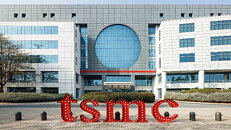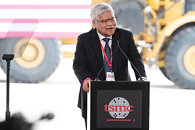T0@st
News Editor
- Joined
- Mar 7, 2023
- Messages
- 2,484 (3.46/day)
- Location
- South East, UK
C.C. Wei, TSMC CEO and Chairman, has shared his latest views regarding his company's North American manufacturing center—Reuters cornered him for comment during a mid-week appearance at a National Taiwan University-held event. The Taiwanese government has recently lowered its "silicon shield"—following much (reported) deliberation over "legal restrictions on transferring leading-edge process technology overseas." This relaxation of rules has TSMC considering a new set of investments for operations outside of Taiwan—with an expansion into advanced node process manufacturing. Currently, 2 nm (N2) is a home turf-speciality—industry experts estimate an expenditure of $28-30 (USD) billion to bring this production technology over to the States. TSMC's CEO has described additional challenges—on top of (and impacting) finances—local bureaucracy is a big one.
Wei stated: "every step requires a permit, and after the permit is approved, it takes at least twice as long as in Taiwan." According Reuters, he reckons that it would be difficult for their North American sites to access the latest technologies ahead of teams in Taiwan. He detailed his company's recruitment of several experts—tasked with talking to local government; about regulatory issues. This was not a cheap undertaking: "we ended up establishing 18,000 rules, which cost us $35 million." TSMC's Arizona production hub will (eventually) consist of three large factories—despite long-term teething problems, Fab 21 is reported to be churning out the first wave of "Made in America" product for a very important client: Apple. Wei expressed positives views when asked about the USA site's prospects—during an earnings conference (Jan 16)—he believes that it will eventually produce the "same quality of chips as in Taiwan," through a "smooth ramp-up process."



Going back to TSMC's native production prowess, Wei said: "it is not that we do not want to ramp up the same technology (in the U.S.) as in Taiwan." The aforementioned regulatory problems—as well as skilled labor shortages, and supply chain woes (e.g. shipping sulfuric acid overseas)—result in slowed progress State-side. He continued with his observations: "when we introduce a new technology into manufacturing, the fab, the process is so complicated—it has to be very close to the R&D people. So, the initial phase of the ramping up always come from the fab close to R&D. So, in that sense, we want to ramp up the same kind of technology in the U.S., but that practically is a little bit difficult. So, Taiwan will always be first."
View at TechPowerUp Main Site | Source
Wei stated: "every step requires a permit, and after the permit is approved, it takes at least twice as long as in Taiwan." According Reuters, he reckons that it would be difficult for their North American sites to access the latest technologies ahead of teams in Taiwan. He detailed his company's recruitment of several experts—tasked with talking to local government; about regulatory issues. This was not a cheap undertaking: "we ended up establishing 18,000 rules, which cost us $35 million." TSMC's Arizona production hub will (eventually) consist of three large factories—despite long-term teething problems, Fab 21 is reported to be churning out the first wave of "Made in America" product for a very important client: Apple. Wei expressed positives views when asked about the USA site's prospects—during an earnings conference (Jan 16)—he believes that it will eventually produce the "same quality of chips as in Taiwan," through a "smooth ramp-up process."



Going back to TSMC's native production prowess, Wei said: "it is not that we do not want to ramp up the same technology (in the U.S.) as in Taiwan." The aforementioned regulatory problems—as well as skilled labor shortages, and supply chain woes (e.g. shipping sulfuric acid overseas)—result in slowed progress State-side. He continued with his observations: "when we introduce a new technology into manufacturing, the fab, the process is so complicated—it has to be very close to the R&D people. So, the initial phase of the ramping up always come from the fab close to R&D. So, in that sense, we want to ramp up the same kind of technology in the U.S., but that practically is a little bit difficult. So, Taiwan will always be first."
View at TechPowerUp Main Site | Source


